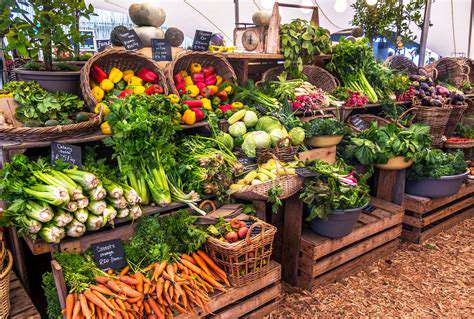Farmers Market Guide: How to Shop Smartly
Jun 21, 2025 / btwgardenmachine/

Strategies for Smart Produce Purchasing
Planning Your Trip
Before heading to the farmer's market, take a few minutes to plan your visit. Consider what you need to prepare meals for the week. A simple menu plan can help you avoid impulse buys and ensure you're purchasing only what you'll use. This pre-planning will not only save you money but also reduce food waste by buying only what you need.
Make a list of the fruits and vegetables you'd like to purchase, noting any specific varieties you prefer. Knowing exactly what you want ahead of time helps you focus on your goals while shopping, minimizing the temptation of less essential or more expensive items. This focus will help you stick to your budget.
Understanding Seasonal Produce
Farmer's markets are a wonderful opportunity to experience the freshest, in-season produce. Understanding what's currently in season allows you to buy the most flavorful and often the most affordable options. Knowing which items are best during specific seasons will help you choose the tastiest and most nutritious produce.
Researching seasonal availability for your region can help you discover which fruits and vegetables are at their peak ripeness and flavor. This knowledge will help you make informed choices that maximize the taste and nutritional value of your purchases.
Evaluating Quality and Condition
Look closely at the produce you're considering. Freshness is key. Look for firm, unblemished fruits and vegetables, avoiding those with bruises, soft spots, or signs of decay. Paying attention to these details will help you avoid bringing home produce that won't last long or won't taste as good.
Feel the texture of the produce. Does it have the expected firmness? This tactile assessment can help you identify the freshest and ripest options. A firm and crisp texture is a good indication of high quality. Avoid produce that feels overly soft or mushy.
Negotiating and Asking Questions
Don't be afraid to ask questions of the vendors. They often have valuable insights into the growing process and the best ways to store and prepare their produce. Learning about the origin and growing methods of your food can enhance your appreciation for the product.
If you're comfortable, consider negotiating prices, especially if you're purchasing a large quantity of a particular item. Friendly interaction can sometimes lead to favorable deals, allowing you to get the most value for your money.
Considering Storage and Preparation
Think about how you'll store and prepare the produce you purchase. Will you need to wash, peel, or chop it immediately? Knowing this ahead of time will help you make informed choices about which items are best suited for your immediate needs.
Planning how you will use the produce you buy is essential for maximizing its freshness. If you're not planning to use it immediately, consider how you will store it properly to maintain its quality and prevent spoilage. This planning will help you avoid food waste.
Making the Most of Deals and Discounts
Farmer's markets often offer deals and discounts, especially towards the end of the day. Be prepared to take advantage of these opportunities to save money. A little patience and vigilance can lead to substantial savings on your produce purchases.
Choosing the Right Quantity
Be realistic about how much produce you can use in a given timeframe. Don't buy more than you can consume before it spoils. Making smart choices about quantity will help you avoid food waste and ensure that you get the best value for your money.
Buying in quantities that match your family's needs is key. Overbuying can lead to wasted food, while buying too little can result in insufficient ingredients for your planned meals.